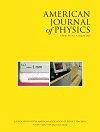三个或更多台球之间的斜角碰撞
IF 0.9
4区 教育学
Q3 EDUCATION, SCIENTIFIC DISCIPLINES
引用次数: 0
摘要
两个球或两个盘之间的斜角碰撞已被许多作者解决。本文描述了三个或四个台球之间的斜角碰撞。给出了一个球斜入射到两个或三个相同的球上的测量和计算,这两个球接触并最初处于静止状态。仅靠守恒定律不足以预测结果。加入关于每个球的冲击力的信息(忽略摩擦力)提供了与实验结果良好的理论一致性。本文章由计算机程序翻译,如有差异,请以英文原文为准。
Oblique angle collisions between three or more billiard balls
Oblique angle collisions between two balls or two disks have been addressed by many authors. This paper describes oblique angle collisions between three or four billiard balls. Measurements and calculations are presented for cases where one ball is incident obliquely on two or three identical balls, which are in contact and initially at rest. Conservation laws alone are not sufficient to predict the outcome. Adding information about the impact forces on each ball (and ignoring friction forces) provides good theoretical agreement with experimental results.
求助全文
通过发布文献求助,成功后即可免费获取论文全文。
去求助
来源期刊

American Journal of Physics
物理-物理:综合
CiteScore
1.80
自引率
11.10%
发文量
146
审稿时长
3 months
期刊介绍:
The mission of the American Journal of Physics (AJP) is to publish articles on the educational and cultural aspects of physics that are useful, interesting, and accessible to a diverse audience of physics students, educators, and researchers. Our audience generally reads outside their specialties to broaden their understanding of physics and to expand and enhance their pedagogical toolkits at the undergraduate and graduate levels.
 求助内容:
求助内容: 应助结果提醒方式:
应助结果提醒方式:


